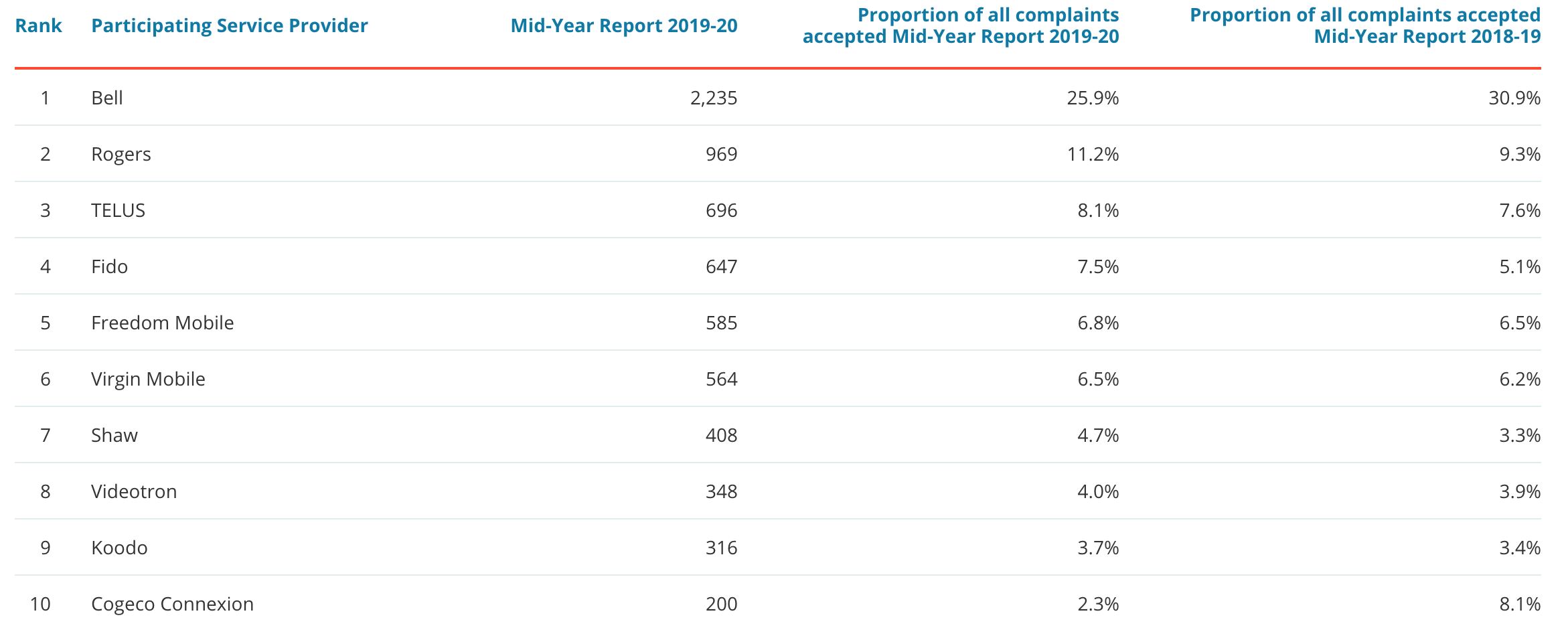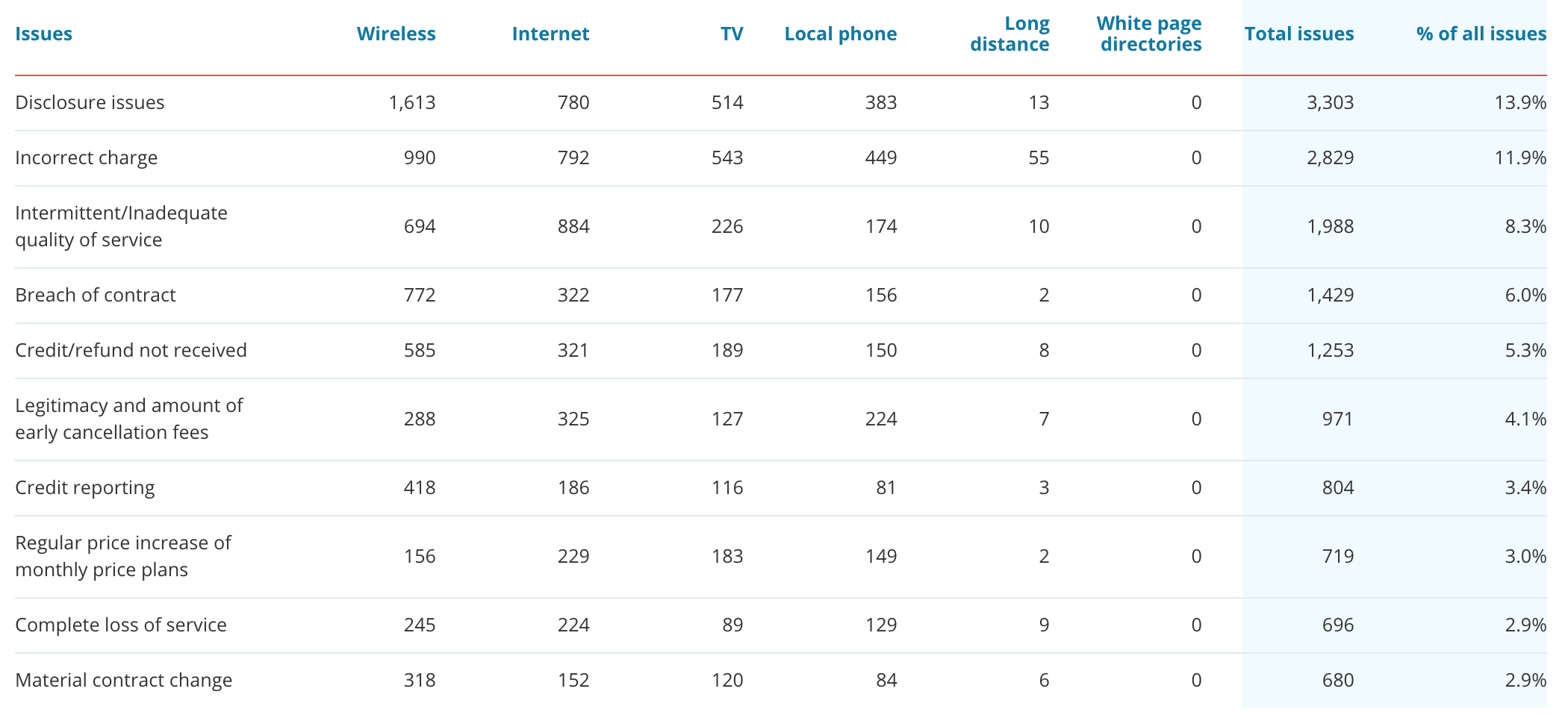
The Commission for Complaints for Telecom-television Services (CCTS) saw a 12 percent year-over-year decrease in the number of complaints it received, according to its mid-year report.
The CCTS notes that it accepted 8,621 complaints between August 1st 2019 to January 31st 2020. Last year, the commission accepted 9,831 complaints between the same time frame.
It outlines that Bell and Cogeco largely contributed to the overall decline in complaints. For instance, Cogeco recorded a 75 percent year-over-year decrease in complaints, while Bell saw a 26 percent decline.
Bell says that it “has made it a strategic imperative to champion customer experience and today’s CCTS results indicate our strategy continues to deliver results.”
Vancouver-based national carrier Telus also saw a seven percent decrease in complaints. A spokesperson from the company tells MobileSyrup that: “Telus has led the industry with the fewest complaints amongst national carriers since 2011, and we are proud to maintain that position and see that complaints about our company have decreased since the mid-year report last year.”
Further, Freedom Mobile recorded a 8.2 percent decline in complaints. Rogers’ flanker brand Fido saw a 29 percent increase in complaints and Rogers itself saw a six percent increase.
Toronto-based national carrier Rogers notes that: “customers’ feedback is so critical and we’ll continue to make important investments in their experience. We are committed to being clear, simple and fair and putting our customers first in everything we do.”
 The CCTS received a total of 2,235 complaints related to Bell, 969 related to Rogers, and 696 in terms of Telus. It also received 649 complaints related to Fido, 585 in terms of Freedom Mobile, 564 related to Bell’s flanker brand Virgin Mobile, 408 related to Shaw, 348 in terms of Vidéotron, and 316 related to Telus’ flanker brand Koodo.
The CCTS received a total of 2,235 complaints related to Bell, 969 related to Rogers, and 696 in terms of Telus. It also received 649 complaints related to Fido, 585 in terms of Freedom Mobile, 564 related to Bell’s flanker brand Virgin Mobile, 408 related to Shaw, 348 in terms of Vidéotron, and 316 related to Telus’ flanker brand Koodo.
The commission resolved 90 percent of the complaints it received. For context, 5,965 were resolved at pre-investigation, 1,785 were resolved following investigations, 319 were closed at pre-investigation and 565 were closed after investigations.
Issues regarding wireless services made up 44.2 percent of all complaints reported, and internet issues made up 26.5 percent, while TV and local phone issues made up the rest.
“Disclosure issues” and “incorrect charges” were the most complained-about problems, consisting of 26 percent of all reported issues. In terms of disclosure issues, the main problem that customers reported had to do with “agreement conflicts with what the customer agreed to,” as there were 1,065 complaints related to this problem.
Customers also submitted complaints about being “misinformed about promotions,” as there were 321 complaints about this issue related to wireless services.
The CCTS reports that it found 46 confirmed breaches of the Wireless Code. Eighteen of the breaches were due to a service provider not giving “reasonable notice to the customer at least 14 calendar days or/and 24 hours before disconnection and the notice did not contain all relevant information.”
Further, nine of the breaches were due to the fact that a paper or electronic copy of a contract was not provided to the customer, or that the contract did not include all of the information listed in the Wireless Code.
Nine more confirmed breaches were related to service providers not suspending roaming data overage charges once they reached $100.
The CCTS notes that customers often raise issues that fall outside of its mandate. For instance, the commission cannot address complaints about specific customer service, such as wait times or rude representatives. Interestingly, the commission received 4,992 complaints about this issue.
It also is unable to address complaints about general operating practices and policies like the contents of plans and packages, but it received 2,885 complaints related to this issue.
Image credit: CCTS
MobileSyrup may earn a commission from purchases made via our links, which helps fund the journalism we provide free on our website. These links do not influence our editorial content. Support us here.



